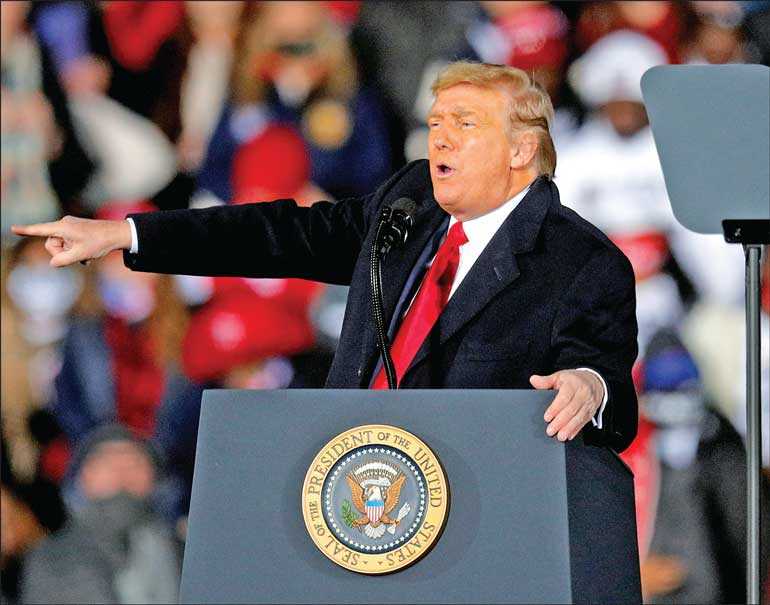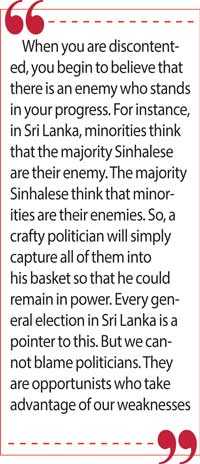Monday Feb 23, 2026
Monday Feb 23, 2026
Monday, 11 January 2021 00:05 - - {{hitsCtrl.values.hits}}

Trump’s attempt at seizing power illegally was thwarted by the strong institutional setup within the US system. That would not have happened in a country like Sri Lanka
Aseni and her Grandpa, Sarath Mahatthaya, are trying to figure out what happened in US Legislature, known as Capitol Hill, on 6 January and diagnose how and why an alleged coup by  a sitting President to remain in power was thwarted.
a sitting President to remain in power was thwarted.
Aseni: Grandpa, global news networks are full of news on the disastrous mob attack on the Capitol Hill while legislators from both houses, the Senate, and the Congress, were counting votes from states for the President who is to take office on 21 January. The joint session was chaired, as the law requires, by Vice President Mike Pence who himself was the candidate for Vice-Presidency under President Donald Trump. Those people who had gathered at the Capitol Hill, seemed to have been emboldened by an inciting speech by Trump, had stormed the building and taken possession of it for a brief period before they were evicted. During the possession, the legislators had run here and there for safety of life. Why should this happen in a country like USA which is considered the holy shrine of democracy?
Sarath: Mob attacks are not uncommon in the world and USA is not an exception. It is a part of the genetic code of all species. The Sri Lankan born scientist of Johns Hopkins University fame, Hasini Jayatilaka, who is credited for what is now known as Hasini Effect, has found that even the cancer cells when living together in a congested space push their neighbours out. According to her, that is how cancer spreads to other organs. You can watch her TED speech by logging into https://www.youtube.com/watch?v=1fZ915L1w7I. So, when humans live together, there is a lot of unfulfilled wishes piling up in them. This self-dissatisfaction creates outrage, and when that outrage reaches the boiling point, they are ready to take it on their neighbours. But there are certain conditions that must be satisfied for them to work in a group to take it on others.
Aseni: What are those conditions, Grandpa?
Sarath: First of all, they should have a supporting leader who will build them emotionally ready for action. That leader, by preaching his doctrine to them day and night, cushions their mentality to accept only what he says without questioning. In the opposite, everything else which others say is rejected. In short, they become intellectual slaves to the leader.
Second, they should feel that they could escape with impunity after they do their mob attack. This is mostly effective when they have the blessings of the authorities. Trump had given this assurance to mobs. That is why they had the confidence even to sit in the Speaker’s chair in her office.
Third, there should be a propaganda machinery that would keep a communication line open with them continuously. In olden times, that communication line worked through either word of mouth or letters dispatched. Then, in 1980s, as was the case with the second JVP insurrection in Sri Lanka, posters on walls took their place. Today, it is the high-technology and social media. People use Facebook, Viber, WhatsApp, YouTube, or Twitter to communicate with their fellow supporters on a real time basis. This was generously used by Trump to communicate with his supporters reaching out millions at a time. His supporters who have become his intellectual slaves were waiting for a new message from him to accept. And the tone and the content of that message are considered by them as if they have been delivered by a deity. This was how his conspiracy theory about the fraudulent election in USA was accepted without questioning by millions of Americans.
A final condition that should be there is for people to act in unison quicky. For that, there should be built up hatred toward somebody or some class of people. A good example is when an accident occurs in Sri Lanka how people in the neighbourhood act in unison as if driven by an external super force, burn the vehicle and beat the driver, if caught, even to death. That is because they have a common feeling that drivers are bad, reckless and should be punished forthwith. This happens so suddenly and uncontrollably that even the victim of the accident is left on the road without bothering to take him or her to a hospital.
Aseni: But Grandpa, there were 74 million Americans who had voted for Trump. It is too much to argue that he had taken all of them as his intellectual slaves. If one person can build such an empire of slaves, he should really be recognised as an achiever, in today’s sense.
Sarath: No, Trump did not build that empire. He simply collected them and skilfully put them into his basket. It is like a fisherman catching a lot of fish and putting them into his basket so that he could barbecue them at will. This was eloquently put by the American freelance writer, Jessica Wildfire. You can read her analysis at https://medium.com/the-apeiron-blog/donald-trump-won-no-matter-what-happens-next-203f7c3a55c7. According to her, lots of Americans have some common features. They are selfish and arrogant, lazy and judgmental, racist and homophobic, and loud and aggressive. Trump had simply given leadership to them.
When people vote, she says, they do so not by basing their judgment on policies or the future, but for their own selfish, completely illogical reasons. All these people are daydreamers fantasising about a happy life. When that happiness does not come, they are eternally discontented. That continued discontentedness grows within them like a cancer and then, they are ripe to be captured by smart leaders, no matter they are political, civic, or religious. So, it is Americans themselves who have yielded to Trump’s cunning schemes.
Aseni: But Grandpa, it is not common only to Americans. In Sri Lanka too, we find a lot like that.
Sarath: This is a common feature about Homo sapiens throughout the world. When you are discontented, you begin to believe that there is an enemy who stands in your progress. For instance, in Sri Lanka, minorities think that the majority Sinhalese are their enemy. The majority Sinhalese think that minorities are their enemies. So, a crafty politician will simply capture all of them into his basket so that he could remain in power. Every general election in Sri Lanka is a pointer to this. But we cannot blame politicians. They are opportunists who take advantage of our weaknesses. Their view is that if they do not take advantage of our weaknesses, someone else will do it. Why should they allow someone else to do it when they themselves can exploit us? So, it is a race to capture and manipulate us as if we are toys in their hands. Trump is very smart at this.
Aseni: Now I understand why he created this ‘stolen election conspiracy’. His supporters were mentally so cushioned that they were waiting for that type of a conspiracy theory to act on. Isn’t it the case, Grandpa?
Sarath: Yes, it is. His lawyers went before courts pleading that the vote counting in several states should be halted because they were illegal votes. He went even to a hilarious extent in that respect. He said that the votes cast by overseas Americans had been intercepted by Russians and Chinese in transit and changed in favour of his rival. His supporters believed it. But judges who had mostly been appointed by him did not see it that way. They were rejected one after the other. That provided evidence of the presence of a strong institutional setup in USA. That is why economists argue that strong institutions are a sine qua non for the progress of a nation. This was the main thesis by economists
Daron Acemoglu and James Robinson who wrote the book ‘Why Nations Fail?’.
Aseni: What are those institutions? Are they formal organisations like companies or political parties?
Sarath: No. In economics, they are not necessarily formal bodies. According to Acemoglu and Robinson, institutions are ‘the rules influencing how the economy works, and the incentives that motivate people’. In a broader sense, we can say that institutions are beliefs, values, and ethos of a large section of society that can influence its future path. We call it a critical pool. If we have one or two people in society who have a specific belief or value system, or a set of ethos, that is not an institution. For instance, if one person believes that all his neighbours should be killed, it is not a critical pool that can influence the path of society. But if we have a large number that believes so, then, in economics, they form an institution.
In Sri Lanka, there is a particular institution relating to motorists. That is the belief they harbour in them that each one of them has the right of the way, all other motorists should allow him or her to pass and road rules should be obeyed only when there is a policeman watching them. And these beliefs, values and ethos do certainly affect the behaviour of formal organisations. For instance, the institution relating to motorists I have mentioned is utterly selfish. In an organisation, if a critical pool of people are selfish people, then, the organisation too will work for the attainment of its selfish goals no matter what it means for others in society.
Aseni: So, beneficial beliefs, values and ethos are important for society to progress. Isn’t it, Grandpa?
Sarath: Yes. Acemoglu and Robinson have categorised them into extractive institutions or inclusive institutions. Extractive ones are those that believe, accept as their values, and follow the ethos that robbing others is not a bad thing. Bribery and corruption are an acceptable form of behaviour in such societies.
Inclusive institutions represent a system of beliefs, values, and ethos that recognise the rights of others. The first category can be called destructive institutions, while the latter can be called constructive institutions. A society needs more of such constructive institutions.
Aseni: How can you relate this to Trump’s failed coup attempt?
Sarath: The people who had to make decisions in this case, except a few who had been Trump’s intellectual slaves, were following constructive beliefs, values, and ethos. That was evident at every stage of the presentation of the alleged election robbery. When the votes were being counted, Trump prevailed upon Governors who represented his party in states where Joe Biden was leading not to release the results. But those Governors did not listen to him and simply followed the election rules.
Then his lawyers took these cases before courts. But all the judges, some of them had been appointed by Trump himself, threw out case after case citing there was no validity in the argument that election had been robbed.
Then, Trump tried to overturn the results of the election at the joint session of the Congress and the Senate on 6 January. He had earlier promised his supporters that he would be confirmed as duly elected President at this joint session. To block the confirmation of the election of Joe Biden to Presidency, he got some of his loyalists in the Senate and the Congress to oppose when the electoral votes of the states which had earlier declared Biden’s victory were taken up. He had counted on the majority he had in the Senate. But to his amazement, his objections were rejected by the Senate by 92 to 8. Out of the 92 which had rejected the objections, 43 were from his party. The same development was seen in the Congress too. Most Congressmen from his party had voted against the objections.
By doing so, they rejected the party line. That is because their beliefs, values and ethos were constructive and not destructive. They had firmly believed that Trump’s way of handling things would not augur well for USA. Hence, leaving aside the party line, they voted for USA. The greatest hero in this instance was Mike Pence, the Vice President under Trump Administration. He and Trump had fought the election together against Joe Biden and Kamala Harris. Even at the last minute, according to reports, Trump had tried to influence Pence to reject those votes that had come from states electing Biden. But Pence’s beliefs, values, and ethos did not allow him to obey Trump. That is the best example we can cite for the existence of a strong institutional setup in USA.
So, Trump’s attempt at seizing power illegally was thwarted by the strong institutional setup within the US system. That would not have happened in a country like Sri Lanka.
Aseni: Grandpa, why do you say that it would not have happened in Sri Lanka?
Sarath: Sri Lanka’s institutional setup is weak. The beliefs, values, and ethos harboured by people as well as its lawmakers are extractive or destructive in nature. They are all guided by selfish party politics. People have been polarised into different groups based on their party loyalties. Hence, it is not justice or conscience that would play a role when they make choices. It is their party line that would guide them. We find enough evidence to support this when we peruse what many of these people have posted to their social media accounts. They seek to defend insanely their party line, while ridiculing anything opposed to them. Hence, if a sitting President tries to remain in power after he has been rejected by people, the weak institutional setup cannot protect the rights of the people. So, Sri Lanka’s institutions are extractive or destructive in nature and not inclusive or constructive. It is a pathetic situation, but it is the stark reality.
(The writer, a former Deputy Governor of the Central Bank of Sri Lanka, can be reached at [email protected].)